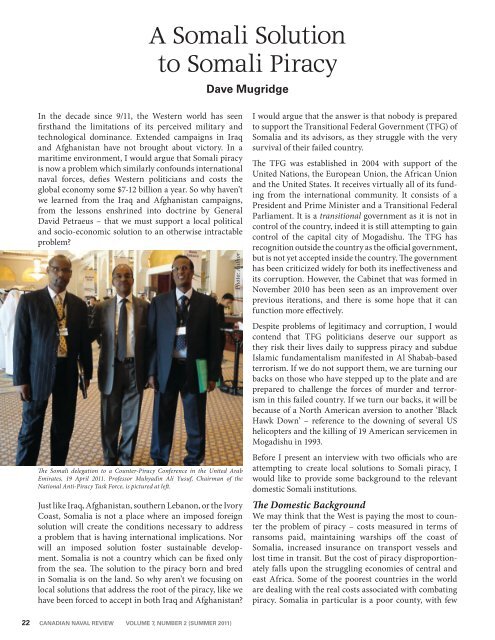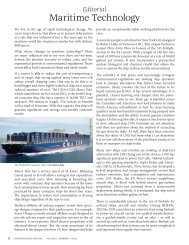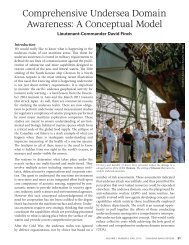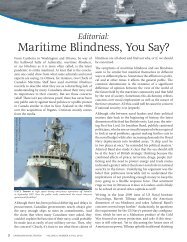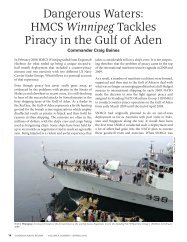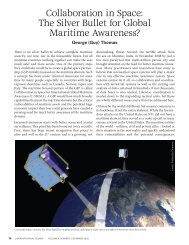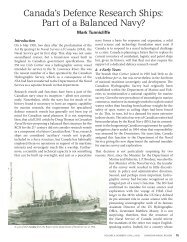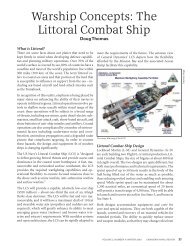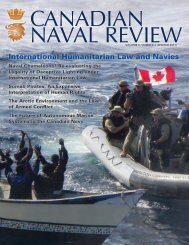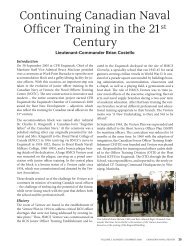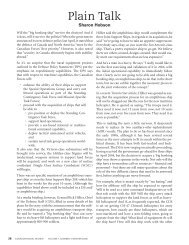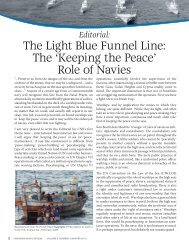A Somali Solution to Somali Piracy - Canadian Naval Review
A Somali Solution to Somali Piracy - Canadian Naval Review
A Somali Solution to Somali Piracy - Canadian Naval Review
You also want an ePaper? Increase the reach of your titles
YUMPU automatically turns print PDFs into web optimized ePapers that Google loves.
A <strong>Somali</strong> <strong>Solution</strong><br />
<strong>to</strong> <strong>Somali</strong> <strong>Piracy</strong><br />
Dave Mugridge<br />
In the decade since 9/11, the Western world has seen<br />
firsthand the limitations of its perceived military and<br />
technological dominance. Extended campaigns in Iraq<br />
and Afghanistan have not brought about vic<strong>to</strong>ry. In a<br />
maritime environment, I would argue that <strong>Somali</strong> piracy<br />
is now a problem which similarly confounds international<br />
naval forces, defies Western politicians and costs the<br />
global economy some $7-12 billion a year. So why haven’t<br />
we learned from the Iraq and Afghanistan campaigns,<br />
from the lessons enshrined in<strong>to</strong> doctrine by General<br />
David Petraeus – that we must support a local political<br />
and socio-economic solution <strong>to</strong> an otherwise intractable<br />
problem<br />
The <strong>Somali</strong> delegation <strong>to</strong> a Counter-<strong>Piracy</strong> Conference in the United Arab<br />
Emirates, 19 April 2011. Professor Muhyadin Ali Yusuf, Chairman of the<br />
National Anti-<strong>Piracy</strong> Task Force, is pictured at left.<br />
Just like Iraq, Afghanistan, southern Lebanon, or the Ivory<br />
Coast, <strong>Somali</strong>a is not a place where an imposed foreign<br />
solution will create the conditions necessary <strong>to</strong> address<br />
a problem that is having international implications. Nor<br />
will an imposed solution foster sustainable development.<br />
<strong>Somali</strong>a is not a country which can be fixed only<br />
from the sea. The solution <strong>to</strong> the piracy born and bred<br />
in <strong>Somali</strong>a is on the land. So why aren’t we focusing on<br />
local solutions that address the root of the piracy, like we<br />
have been forced <strong>to</strong> accept in both Iraq and Afghanistan<br />
Pho<strong>to</strong>: Author<br />
I would argue that the answer is that nobody is prepared<br />
<strong>to</strong> support the Transitional Federal Government (TFG) of<br />
<strong>Somali</strong>a and its advisors, as they struggle with the very<br />
survival of their failed country.<br />
The TFG was established in 2004 with support of the<br />
United Nations, the European Union, the African Union<br />
and the United States. It receives virtually all of its funding<br />
from the international community. It consists of a<br />
President and Prime Minister and a Transitional Federal<br />
Parliament. It is a transitional government as it is not in<br />
control of the country, indeed it is still attempting <strong>to</strong> gain<br />
control of the capital city of Mogadishu. The TFG has<br />
recognition outside the country as the official government,<br />
but is not yet accepted inside the country. The government<br />
has been criticized widely for both its ineffectiveness and<br />
its corruption. However, the Cabinet that was formed in<br />
November 2010 has been seen as an improvement over<br />
previous iterations, and there is some hope that it can<br />
function more effectively.<br />
Despite problems of legitimacy and corruption, I would<br />
contend that TFG politicians deserve our support as<br />
they risk their lives daily <strong>to</strong> suppress piracy and subdue<br />
Islamic fundamentalism manifested in Al Shabab-based<br />
terrorism. If we do not support them, we are turning our<br />
backs on those who have stepped up <strong>to</strong> the plate and are<br />
prepared <strong>to</strong> challenge the forces of murder and terrorism<br />
in this failed country. If we turn our backs, it will be<br />
because of a North American aversion <strong>to</strong> another ‘Black<br />
Hawk Down’ – reference <strong>to</strong> the downing of several US<br />
helicopters and the killing of 19 American servicemen in<br />
Mogadishu in 1993.<br />
Before I present an interview with two officials who are<br />
attempting <strong>to</strong> create local solutions <strong>to</strong> <strong>Somali</strong> piracy, I<br />
would like <strong>to</strong> provide some background <strong>to</strong> the relevant<br />
domestic <strong>Somali</strong> institutions.<br />
The Domestic Background<br />
We may think that the West is paying the most <strong>to</strong> counter<br />
the problem of piracy – costs measured in terms of<br />
ransoms paid, maintaining warships off the coast of<br />
<strong>Somali</strong>a, increased insurance on transport vessels and<br />
lost time in transit. But the cost of piracy disproportionately<br />
falls upon the struggling economies of central and<br />
east Africa. Some of the poorest countries in the world<br />
are dealing with the real costs associated with combating<br />
piracy. <strong>Somali</strong>a in particular is a poor county, with few<br />
22 CANADIAN NAVAL REVIEW VOLUME 7, NUMBER 2 (SUMMER 2011)
Pho<strong>to</strong>: US Navy<br />
US Navy helicopters respond <strong>to</strong> a distress call in March 2011 from a vessel in the Arabian Sea indicating it had been boarded by pirates.<br />
employment opportunities and a significant proportion of<br />
the population reliant on external food assistance. <strong>Piracy</strong><br />
affects the ports of Mombasa (Kenya) and Dar es Salaam<br />
(Tanzania). It makes trade more difficult if ships are being<br />
pirated regularly in the area. This reduces the traffic at<br />
these ports, and a reduction of trade entering and leaving<br />
the ports has regional effects. The cargo that arrives<br />
in Mombasa and Dar es Salaam is not destined just for<br />
Kenya and Tanzania, but also for inland countries such as<br />
Uganda, Democratic Republic of Congo, southern Sudan,<br />
Rwanda and Burundi. 1 These ports account for approximately<br />
20% of sub-Saharan Africa’s container traffic. 2<br />
And it is not just trade that is affected – even the region’s<br />
telecommunication with the outside world is threatened<br />
by piracy because the fibre optic link that connects South<br />
Africa, Tanzania, Kenya, Uganda and Mozambique <strong>to</strong><br />
Europe and Asia lies under <strong>Somali</strong>a’s waters, making<br />
repair or refurbishment impossible.<br />
UN Secretary-General Ban Ki-Moon called for the international<br />
community <strong>to</strong> support the government it had a<br />
hand in creating. In a statement issued on 4 May 2011, he<br />
said “[t]he international community must keep its end of<br />
the bargain.” The international community must help the<br />
transitional government or it will fail. As Secretary Ban<br />
said, “[t]he Transitional Federal Government urgently<br />
needs assistance for Mogadishu’s stabilization, recovery<br />
and reconstruction.” 3<br />
Like the UN Secretary-General, I have begun <strong>to</strong> believe<br />
that local solutions must be given more attention.<br />
Table 1. Some Numbers About <strong>Somali</strong>a and <strong>Piracy</strong><br />
My conversion <strong>to</strong> this belief came during a telephone<br />
interview on 1 May 2011 with Professor Muhyadin Ali<br />
Yusuf, Chairman of the National Anti-<strong>Piracy</strong> Task Force<br />
(NAPTF) of the TFG, and his chief advisor, Sam Mat<strong>to</strong>ck,<br />
of Halliday-Finch. This interview was conducted for The<br />
National, an English language newspaper published in<br />
the United Arab Emirates. In the course of my discussion<br />
with these men, I saw two men intent upon remedying<br />
a problem of global magnitude through the sparse local<br />
means at their disposal.<br />
The TFG is acutely aware of its presentation in the Western<br />
media as corrupt and ineffectual but given the appalling<br />
state of the country it inherited, it isn’t surprising that there<br />
is work <strong>to</strong> be done. And, indeed, is the <strong>Somali</strong> TFG any<br />
worse than the fledgling regimes supported in the transition<br />
<strong>to</strong> democracy in both Iraq and Afghanistan And as<br />
his<strong>to</strong>ry would suggest, in times of crisis you can’t always<br />
choose your bedfellows. Most of the people who make up<br />
the TFG and their advisors are <strong>Somali</strong>s who realize that<br />
unless they act, the situation in their home country will<br />
continue <strong>to</strong> be hopeless. They are predominantly former<br />
members of the diaspora who have returned <strong>to</strong> <strong>Somali</strong>a <strong>to</strong><br />
assume a role in the leadership of their country.<br />
Established by the Office of the Prime Minister on 13<br />
April 2011, the National Anti-<strong>Piracy</strong> Task Force is an<br />
attempt <strong>to</strong> create a comprehensive, cross-government<br />
response <strong>to</strong> the maritime crisis that continues <strong>to</strong> frustrate<br />
the international community response. Its mandate is <strong>to</strong><br />
eliminate piracy from <strong>Somali</strong>a, both on land and at sea,<br />
Total population in need of emergency assistance in 2011 2 million people<br />
Internally displaced population in <strong>Somali</strong>a<br />
1.47 million people<br />
<strong>Somali</strong> refugees in east Africa and Yemen<br />
658,773 people<br />
Total USAID humanitarian assistance <strong>to</strong> <strong>Somali</strong>a $31,667,075 (US FY 2010)<br />
EU’s contribution from 10 th European Development Fund EUR 215.8 (approximately $306 million USD)<br />
Deployed operating costs of frigate/destroyer off <strong>Somali</strong>a $125,000-$150,000 per day per platform<br />
Source: USAID Factsheet 1, 11 January 2011; European Union <strong>Naval</strong> Force <strong>Somali</strong>a (EUNAVFOR), 11 March 2011.<br />
VOLUME 7, NUMBER 2 (SUMMER 2011) CANADIAN NAVAL REVIEW 23
in cooperation with national and international agencies. 4<br />
Like all arms of the <strong>Somali</strong> government, it is dependent<br />
upon international aid for financial support. The TFG<br />
has requested financial assistance from a variety of international<br />
organizations, including NATO, the UN Office<br />
on Drugs and Crime (UNODC), the UN Development<br />
Program (UNDP), the European Union, the International<br />
Maritime Organization (IMO), and the Intergovernmental<br />
Authority on Development (IGAD). The budget of the<br />
task force would be start-up and first-year costs of $52<br />
million and then $27 million annually thereafter. This<br />
money, however, has yet <strong>to</strong> appear and without it any<br />
possibility of delivering a land and lit<strong>to</strong>ral-based local<br />
solution is on hold.<br />
The purpose of the task force – assuming it opens its doors<br />
– is, among other things:<br />
<br />
different ministries which play a part in countering<br />
piracy for the country;<br />
<br />
stakeholders <strong>to</strong> combat piracy;<br />
ties<br />
at a local and international level;<br />
<br />
community groups <strong>to</strong> fight against piracy and sea<br />
robbery from the ground; and<br />
<br />
response with <strong>Somali</strong> maritime police operations<br />
(when they are established).<br />
Given the enormity of the task of ending piracy, the task<br />
force has advisors provided from outside the country.<br />
Providing assistance in this venture is a security company<br />
called Halliday-Finch, which is based in Nairobi, Kenya.<br />
It is a risk management consultancy, which provides<br />
security services and training <strong>to</strong> businesses and government<br />
and non-government agencies anywhere in Africa.<br />
In <strong>Somali</strong>a, Halliday-Finch is trying <strong>to</strong> help the TFG <strong>to</strong><br />
mitigate the political, security and financial risks inherent<br />
in tackling piracy. To the skeptical this is another private<br />
security company looking <strong>to</strong> make a quick buck, but in<br />
the absence of Western political and military assistance<br />
on the ground in <strong>Somali</strong>a, who else can the TFG turn <strong>to</strong><br />
Pho<strong>to</strong>: NATO<br />
The command staff of Standing NATO Maritime Group 1 welcomes officers of the Puntland (<strong>Somali</strong>a) Coast Guard aboard the Portuguese frigate, NRP Alvares<br />
Cabral.<br />
24 CANADIAN NAVAL REVIEW VOLUME 7, NUMBER 2 (SUMMER 2011)
Interview<br />
DAVE MUGRIDGE<br />
Professor, what is your understanding of what the pirates<br />
are doing<br />
PROFESSOR MUHYADIN ALI YUSUF, CHAIRMAN OF<br />
NAPTF<br />
<strong>Piracy</strong> is destroying the fabric of the rich <strong>Somali</strong> culture<br />
and our local way of life. Their actions are making our<br />
own people victims of their criminal activity and only a<br />
very small percentage of <strong>Somali</strong>s benefit from it. Initially<br />
they sailed <strong>to</strong> protect their traditional fishing grounds<br />
from over-fishing and <strong>to</strong>xic waste dumping, but now they<br />
are purely motivated by profit and furthering their illegal<br />
activities. This is now a fully-fledged criminal business.<br />
Illegal money has become the dominant force amongst the<br />
clans, which worsens the chances of stability in <strong>Somali</strong>a<br />
and is costing the global economy a huge sum of money<br />
and possibly <strong>Somali</strong>a its future. The pirates’ actions have<br />
destroyed any foreign trust in our country, so it is now<br />
impossible <strong>to</strong> secure the aid we need <strong>to</strong> rebuild our country<br />
along our traditional cultural lines and beliefs.<br />
DAVID MUGRIDGE<br />
What is Halliday-Finch looking <strong>to</strong> do with the NAPTF<br />
SAM MATTOCK, HALLIDAY-FINCH<br />
We have a five-year strategy with the TFG and the NAPTF<br />
<strong>to</strong> men<strong>to</strong>r a maritime police force as a first step of delivering<br />
a fully functioning and effective national coast guard.<br />
We will use our experience in military and security<br />
training <strong>to</strong> provide <strong>Somali</strong>a with an indigenous solution<br />
<strong>to</strong> its current maritime security malaise. Halliday-Finch<br />
is a proven ethical African partner in this venture and<br />
we believe in complete transparency when dealing with<br />
international backers <strong>to</strong> further this project. For example,<br />
KPMG International will provide overall management of<br />
all funds associated with this project. We have deliberately<br />
aligned our approach <strong>to</strong> that of the UN Development<br />
Program <strong>Somali</strong>a and will work with them and others <strong>to</strong><br />
develop an initial 500 strong force <strong>to</strong> take the fight <strong>to</strong> the<br />
pirates. We are proud and fully supportive of the vision<br />
and comprehensive approach taken by the NAPTF, the<br />
TFG and it is wonderful <strong>to</strong> see all of <strong>Somali</strong>a’s states<br />
supporting this initiative.<br />
DAVID MUGRIDGE<br />
What effect do you believe you can have on the pirates<br />
and what direction have you received from the TFG<br />
SAM MATTOCK<br />
We have set ourselves an ambitious measure of success,<br />
which is <strong>to</strong> reduce the incidence of piracy off the <strong>Somali</strong><br />
coast by 50% by Oc<strong>to</strong>ber 2012. Our combined strategy is<br />
Professor Muhyadin Ali Yusuf talks about piracy and the National Anti-<strong>Piracy</strong><br />
Task Force.<br />
<strong>to</strong> form a security blanket that acts like <strong>Somali</strong> ‘chainmail’<br />
around the coast. Inland, we will form a solid and<br />
trained informer network reporting in<strong>to</strong> a central control<br />
room. From the coastline out <strong>to</strong> 12 nautical miles, our<br />
men will act upon information from the central control<br />
room – this will create a more robust maritime intercept<br />
capability. The final strategy is <strong>to</strong> link in<strong>to</strong> the domain of<br />
the international naval coalition so as <strong>to</strong> choke off piracy<br />
at sea, while concurrently reducing illegal fishing, <strong>to</strong>xic<br />
waste dumping, illegal human trafficking and the use of<br />
the seas by terrorists <strong>to</strong> receive their weapons. We know<br />
that the pirates will try and circumvent our strategy but<br />
with proper levels of foreign assistance and well-trained<br />
and equipped <strong>Somali</strong> men and women we are confident<br />
that by the end of 2016 we will have control of <strong>Somali</strong>a’s<br />
terri<strong>to</strong>rial waters and its exclusive economic zone.<br />
DAVID MUGRIDGE<br />
How can you best accomplish this task<br />
PROFESSOR MUHYADIN ALI YUSUF<br />
By having trained <strong>Somali</strong> personnel at sea delivering<br />
security <strong>to</strong> their country, their people and protecting a<br />
sustainable fishery that will contribute <strong>to</strong> their national<br />
economy for years <strong>to</strong> come. We acknowledge we need<br />
external financial support but we are not alone in that as<br />
Greece, Ireland and Portugal have demonstrated these<br />
are <strong>to</strong>ugh times for small economies. Our <strong>Somali</strong> solution<br />
gives the international community the benefit of our local<br />
Pho<strong>to</strong>: Author<br />
VOLUME 7, NUMBER 2 (SUMMER 2011) CANADIAN NAVAL REVIEW 25
knowledge of piracy and pirates, their tactics and deep<br />
understanding of their culture which allows us <strong>to</strong> tackle<br />
the pirates from within. This, I believe, is the most effective<br />
way <strong>to</strong> deal with this growing problem.<br />
With early foreign financial support and a fully functioning<br />
licensed fishery we can start <strong>to</strong> rebuild <strong>Somali</strong>a and<br />
ensure it can re-join the international community as a<br />
success, not a languishing failure. Establishing a fully<br />
functioning fishing industry is a critical component of<br />
our overall vision as it not only provides employment but<br />
also much-needed revenue. Once we can control the fishing<br />
we believe there will be annual revenues of between<br />
$300-750 million for <strong>Somali</strong>a. 5 This would go a long way<br />
<strong>to</strong> support sustainable and secure development of our<br />
country.<br />
DAVID MUGRIDGE<br />
What resources do you need and when do you need them<br />
SAM MATTOCK<br />
Our campaign plan calls for just under $52 million of<br />
initial funding. This will support the start-up costs, buy<br />
the necessary assets and have the funds readily available<br />
<strong>to</strong> ensure consistent payment <strong>to</strong> our people. Future assets,<br />
assuming that external funds allow this, would include<br />
the following platforms:<br />
<br />
ment/area<br />
sea patrol;<br />
<br />
ships;<br />
<br />
<br />
with support equipment and vehicles.<br />
In years two <strong>to</strong> five we would see the operating costs drop<br />
<strong>to</strong> $27 million per annum and become financed from the<br />
fishery licensing, in a similar manner <strong>to</strong> how the fishery<br />
off the Falkland Islands is managed for sustainability.<br />
DAVID MUGRIDGE<br />
What rules and regulations will you operate under<br />
PROFESSOR MUHYADIN ALI YUSUF<br />
The only effective way <strong>to</strong> counter piracy is <strong>to</strong> act before<br />
they leave the shore, whilst they are preparing for their<br />
illegal expeditions. Countering piracy will also include<br />
tracking down the financiers of piracy and s<strong>to</strong>pping<br />
ransom payments. The TFG believes that any meaningful<br />
intervention should be a holistic, systematic partnership<br />
based on engagement with all relevant stakeholders while<br />
respecting human rights and also being aware that children<br />
are being utilized in acts of piracy so our judicial<br />
system must cater for this as well. The existing <strong>Somali</strong><br />
institutions will have <strong>to</strong> play equal and comparable roles<br />
<strong>to</strong> that of the international community in combating<br />
piracy. We will do what it takes, such as get our antipiracy<br />
legislation before the Parliament and supported by<br />
a special committee <strong>to</strong> ensure it becomes law. We also have<br />
<strong>to</strong> adapt our legal framework <strong>to</strong> the changing situation.<br />
Pho<strong>to</strong>: NATO<br />
<strong>Somali</strong> fishermen off Mogadishu, with the Dutch frigate De Ruyter in the background. A functioning fishing industry is a critical component of a <strong>Somali</strong> solution<br />
<strong>to</strong> piracy, says Professor Muhyadin Ali Yusuf.<br />
26 CANADIAN NAVAL REVIEW VOLUME 7, NUMBER 2 (SUMMER 2011)
Pho<strong>to</strong>: NATO<br />
Officers of the Puntland Coast Guard leave the frigate Alvares Cabral after meeting with NATO officials.<br />
The <strong>Somali</strong> Maritime Security Bill is currently being<br />
considered by the Prime Minister. This bill will ensure all<br />
matters of security at sea are addressed, such as piracy,<br />
<strong>to</strong>xic waste dumping, illegal arms, narcotic and human<br />
trafficking as well as illegal, unreported and unregulated<br />
fishing, port and ship security by adopting the ISPS [International<br />
Ships and Port Security] Code in its entirety. It is<br />
necessary for our maritime policemen <strong>to</strong> be able <strong>to</strong> enforce<br />
the laws of the state and that those laws are aligned with<br />
those of the international community standards as advocated<br />
by the UNODC [United Nations Office on Drugs<br />
and Crime] and INTERPOL [the International Criminal<br />
Police Organization].<br />
SAM MATTOCK<br />
We see it as essential that due process of law is followed<br />
and those <strong>Somali</strong>s suspected of piracy are detained, tried<br />
and if proven guilty incarcerated in <strong>Somali</strong>a rather than<br />
foreign countries. We would also like <strong>to</strong> investigate using<br />
a floating prison barge <strong>to</strong> act as a rehabilitation centre for<br />
those convicted, so that when they re-join their communities<br />
they have been equipped with worthwhile skills <strong>to</strong><br />
contribute <strong>to</strong> nation-building rather than murder and<br />
pirating. Such a prison barge would contribute most effectively<br />
<strong>to</strong> our comprehensive strategy and allow for foreign<br />
oversight of the program as we move forward. We see<br />
this as an equivalent of Saudi Arabia’s highly successful<br />
de-radicalization program which has successfully turned<br />
young men away from terrorist violence.<br />
Conclusions<br />
In conclusion, for less than half of the financial aid given<br />
<strong>to</strong> <strong>Somali</strong>a by the United States and European Union in<br />
2009, we could perhaps turn a corner against piracy. <strong>Naval</strong><br />
task forces have been stationed off the coast of <strong>Somali</strong>a<br />
for some time now, and yet the incidence of piracy is still<br />
worryingly high. Is it not time for a domestic on-land<br />
approach <strong>to</strong> be supported by the international community<br />
and receive the leg-up it needs <strong>to</strong> start providing a<br />
local solution <strong>to</strong> a problem that costs the world billions If<br />
piracy costs $7-12 billion <strong>to</strong> the global economy annually,<br />
funding the annual budget of the NAPTF (estimated at<br />
$27 million) <strong>to</strong> s<strong>to</strong>p it seems like a wise investment. The<br />
G8 and the international shipping community should<br />
support this venture as part of their contribution <strong>to</strong> countering<br />
piracy. But – and this is a big but – financial due<br />
diligence needs <strong>to</strong> be guaranteed.<br />
Notes<br />
1. Christine Mungai, “Ransom, <strong>Naval</strong> Operations Push <strong>Piracy</strong> Costs <strong>to</strong> $12<br />
bn,” The East African, Kenya Edition, 2 May 2011.<br />
2. Ibid.<br />
3. UN Secretary-General Ban Ki-Moon, statement, 4 May 2011, available at<br />
www.un.org/news/dh/pdf/english/2011/04052011.pdf.<br />
4. Office of the Prime Minister, The Transitional Federal Government of<br />
the <strong>Somali</strong> Republic, 13 April 2011, Ref XRW/00000595/04/11. The office<br />
of the Anti-<strong>Piracy</strong> Task Force was opened in July 2010.<br />
5. EU humanitarian assistance is still less than illegal fishing was costing<br />
<strong>Somali</strong>a.<br />
Dave Mugridge is an independent maritime security consultant<br />
and holds a research fellowship at the Centre for Foreign Policy<br />
Studies at Dalhousie University.<br />
VOLUME 7, NUMBER 2 (SUMMER 2011) CANADIAN NAVAL REVIEW 27


